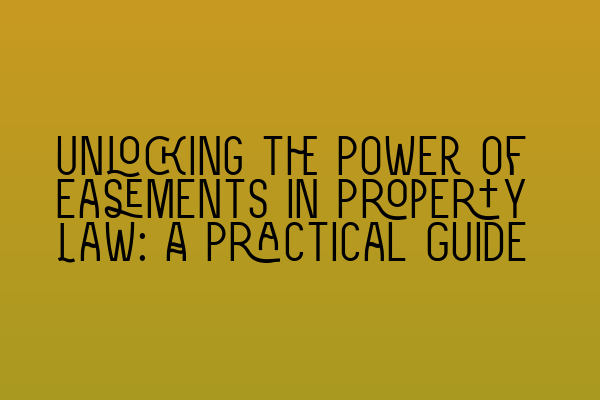Unlocking the Power of Easements in Property Law: A Practical Guide
Welcome to SQE Property Law & Land Law, your trusted solicitors specializing in property law. In this blog post, we will discuss one of the fundamental aspects of property law: easements. Whether you are a property owner, developer, or someone interested in the legal intricacies of property rights, understanding easements is crucial. So, let’s dive right in and unlock the power of easements in property law.
What are Easements?
An easement is a legal right that allows a person to use someone else’s property for a specific purpose. It grants a non-possessory interest in someone else’s land, typically for the benefit of another property. Easements can have a significant impact on property use, development, and rights, making them a vital aspect of property law.
There are various types of easements, including:
- Right of way: This allows a person to pass through another person’s property, such as accessing a public road or neighboring property.
- Utility easements: These grant utility companies the right to access and maintain utility infrastructure on someone else’s land.
- Drainage easements: These allow water to flow across one property to another, preventing flooding and water damage.
- Conservation easements: These protect natural resources and limit development on a specific property.
Easements can be created through various methods, including express agreements, implied agreements, necessity, prescription, and statute. It is essential to consult a legal professional to determine the most suitable method for creating or modifying an easement.
The Importance of Easements in Property Law
Easements serve several crucial purposes in property law:
- Facilitating property access: Easements ensure that property owners have legal access to their properties. They enable people to reach their homes, businesses, and other properties without infringing on the rights of others.
- Promoting property development: Easements can provide necessary utility access, such as electricity, water, or gas lines, enabling new developments to take place.
- Protecting property rights: Easements can prevent neighboring property owners from taking actions that could interfere with the enjoyment or value of a property, such as blocking access or obstructing views.
- Preserving environmental interests: Conservation easements promote the protection of natural resources, wildlife habitats, and open spaces, contributing to sustainable development.
The power and importance of easements in property law cannot be understated. By understanding easements and their implications, you can navigate property transactions, resolve disputes, and protect your property rights effectively.
Seeking Legal Expertise
At SQE Property Law & Land Law, we have a team of expert solicitors who specialize in property law, including easements. Whether you need assistance in creating, modifying, or resolving disputes related to easements, we are here to help.
By working with our experienced solicitors, you can benefit from:
- Extensive knowledge of property law and easement regulations
- Professional advice tailored to your specific circumstances
- Efficient resolution of easement-related conflicts and disputes
- Guidance in property development and transactions involving easements
Unlock the full potential of easements in property law by partnering with SQE Property Law & Land Law.
We hope you found this practical guide to easements in property law helpful. If you want to delve deeper into legal research skills, SQE2 exam details, strategies for success, core concepts, or case studies, check out our related articles:
- 48. Unlocking Legal Research Skills for SQE Success
- 62. SQE2: Everything You Need to Know About the Second Stage Exam
- 3. Re-taking the SQE: Strategies for Success
- 53. Functioning Legal Knowledge (FLK): Core Concepts for SQE Candidates
- 65. Case Studies in SQE: Applying Knowledge to Real-Life Scenarios
If you have any questions or require legal assistance, feel free to reach out to SQE Property Law & Land Law. Our team is ready to provide you with expert advice and professional representation.
Disclaimer: The information provided in this blog post does not constitute legal advice and should not be relied upon as such. Consult a qualified solicitor for personalized legal guidance.
